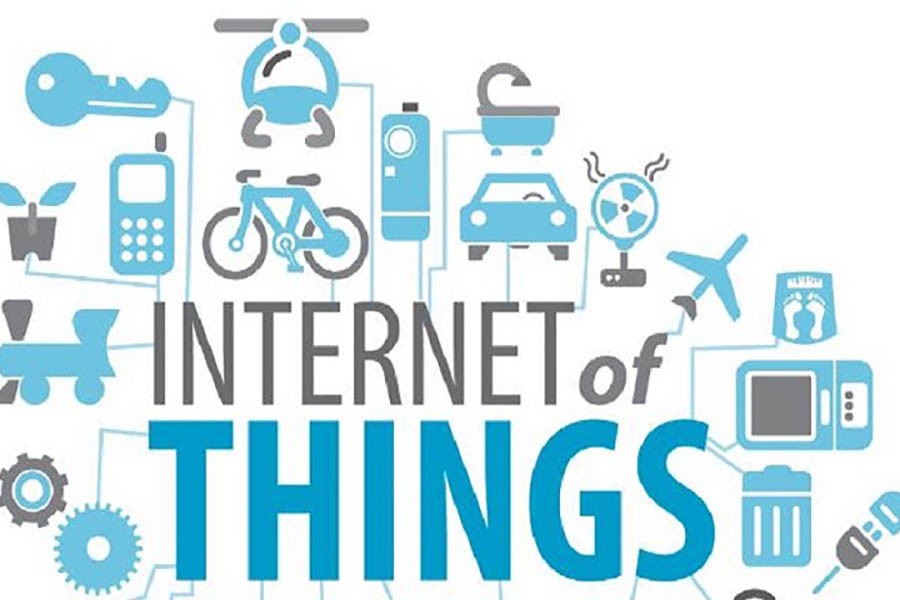The year 1990 brought a new dimension to the world of technological advancement when the modern internet, invented by computer scientist Berners-Lee, with World Wide Web (www) was introduced to the world. Since the invention of the internet the world has been experiencing many innovative internet-based services and solutions. Bangladesh has welcomed internet technology, as proven by over 8.7 crore internet subscribers enjoying such services.
But internet has advanced its presence from desktops to laptops to smartphones. It has, moreover, flourished its essence by creating Internet of Things or IoT. IoT refers to the network of physical objects with an IP address for internet connectivity and communicating with other Internet-enabled devices and systems.
IoT has legally entered Bangladesh with a directive issued by the Bangladesh Telecommunication Regulatory Commission (BTRC) in April this year. The BTRC mentioned nine sectors where IoT technology can be used in the country: smart building, industry automation, smart grids, water management, waste management, smart agriculture, telecare, intelligent transport system, environment management, smart urban lighting and smart parking.
However, there are five challenges before IoT in the country: lack of IoT-supportive internet connectivity; lack of IoT-skilled human resources; lack of availability of smart home assistant appliances and compatible services; lack of power resources and finally lack of financial support.
Seamless internet connection is mandatory for enabling IoT systems or devices. That is our first identified challenge Bangladesh is facing, to which an executive, business development of Cloudly InfoTech agrees. Although recently Bangladesh successfully tested 5G mobile internet connectivity within a specific restricted circumstance, there is lack of even a complete 3G penetration throughout the whole country. Especially outside the metropolitan cities like Dhaka or Chattagram the internet access and network quality are quite problematic.
The 2nd challenge facing the country is technologically skilled personnel. Bangladesh lacks enough expertise in IoT. There are some attempts to train personnel in IoT by various institutions like the BRAC University, Grameenphone in collaboration with IEEE, Datasoft, Bangladesh Skill Development Institute, Global Skills Development Agency. However, there is a need for higher level of skilled workers in IoT in order to reap benefits across the nine sectors as outlined by the BTRC.
The 3rd challenge is availability of IoT devices and their compatible services. IoT-enabled smart home service requires home assistants like Google Home or Alexa which are still not fully functional in the country as online applications like YouTube Music, Spotify, Google play Music and so on are not accessible through such smart home assistant products. Moreover, lack of IoT enabled appliances such as lights, speakers, locks, thermostats and sensors magnifies the struggle to establish a smart home system in Bangladesh. However, few electronic retail shops are selling smart lights and locks, mostly Chinese, but they are expensive for the unaware consumers. Agreeing to this, experts opined that the mindset of consumers is very important for accepting a new technology like IoT and currently Bangladeshi consumers lack this mindset.
Compared with developed countries, Bangladesh is vulnerable when in matters of seamless electricity supply in the country. It is the 4th challenge. Though electricity supply has reached 90 per cent of the population, far better than what it used to be a decade ago, yet the requirement of seamless continuous power supply for IoT devices and operation is a big challenge. With Rooppur Atomic Power plant under construction, the hope for higher and uninterrupted power supply can be imagined after 2023.
The 5th challenge is the financial challenge. An IDC report shows that IoT is an expensive technology of US$ 772 billion worldwide and progressing towards the 1.0 trillion USD mark in just two years. The technology requires huge spending to create and operate devices. Even with BDT 500 billion of investments in IT sector of Bangladesh, there is no specific data to find out the amount invested in IoT, but our assumption based on the current IoT products and services available in the country is that it could be less than 5. 0 per cent of the BDT 500 billion. Even with this assumed investment amount, as an executive of DataSoft complains, the government's current policies are one of the barriers to implementing IoT on a commercial level.
Regardless of all these challenges, companies like DataSoft, Cloudly InfoTech, AblombTech, Walton are trying to lay the foundation for IoT industry in Bangladesh.
DataSoft launched its state-of-the-art IoT laboratory on November 13, 2016 in Dhaka. DataSoft is also establishing 10,000 smart homes in Tokyo, Japan using the next generation IoT solutions what can be termed a spectacular leap for the country's IT industry. They also signed an agreement with the Ministry of Transport and Communication Channels of Democratic Republic of Congo (DRC) to advise and install IoT-based toll management solution for its Matadi Bridge.
Cloudly InfoTech, being the first AWS partner in the country, is also gaining credibility for its Business and Consumer IoT products and services such as Smart home, Smart building, Smart factory, Smart farming, Smart warehouse, Smart Campus in the local and global market with Indian, American and Chinese partners providing devices, installation and maintenance services.
AplombTech is another local company that provides smart switch, different types of smart lights, smart camera, smart curtain and smart tank.
Walton has introduced smart air conditioner recently; Gadget & Gear is selling smart home assistants like Google Home, Amazon Alexa while Samsung has brought smart washer in the country.
In order to overcome these challenges, a Datasoft executive suggests for the government to convert hundreds of government-commissioned homes to smart homes. Other required support is already available. Also, investments, specifically for the IoT technology can be encouraged by the government from various public and private sectors.
Kamal Hossain is a senior lecturer at the Business School of BRAC University; Anuron Rahman is research assistant and BBA student at BRAC University.


